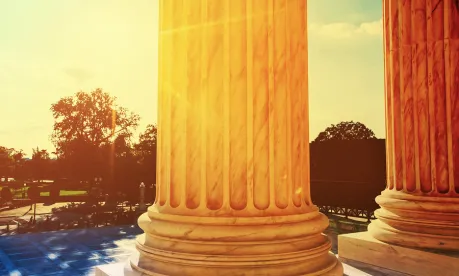The Wisconsin Supreme Court has issued numerous decisions over the past few years regarding an insurer’s duty to defend its insured under liability insurance. On February 13, 2020, the Court added Choinsky v. Germantown School District, Case No. 2018AP116, 2020 WI 13, where it clarified one of the four recognized procedures for insurance carriers to contest coverage while avoiding a breach of the duty to defend. The four procedures are: (1) defend under a reservation of rights; (2) defend under a reservation of rights but seek a declaratory judgment on coverage; (3) enter into a nonwaiver agreement with the insured where the insurer preserves its right to contest coverage; and (4) file a motion to bifurcate and stay the liability determination until coverage is determined. Choinsky addressed a wrinkle to option 4, where the insurer files the appropriate motions but the circuit court denies the stay.
In Choinsky, retirees of the Germantown School District brought a class action in 2013 after a District decision caused them to lose their long term care benefit. The retirees alleged breach of contract, breach of implied contract, breach of the duty of good faith and fair dealing, and promissory estoppel. The District tendered the defense to its insurer, which the insurer denied a week later. Then, following option 4, the insurer promptly moved to intervene in the pending suit, to bifurcate the coverage and liability issues, and to stay a liability determination until coverage was decided. Almost three months later, the circuit court granted the motion to intervene and bifurcate, but denied the motion to stay. The insurer then agreed to retroactively defend from the date of tender until coverage was resolved. As a result, the District had to defend itself on both coverage and liability for approximately five months and was later reimbursed only for its attorney fees on the liability defense.
After two motions by the insurer for summary judgment were denied, coverage was tried to a jury in April 2016. The jury found that the District decision makers had acted negligently, and the circuit court accordingly determined that there was a duty to defend. After the liability trial resulted in a jury verdict in favor of the District, the District moved again for attorney fees it incurred in proving coverage pursuant to Elliott v. Donahue, 169 Wis. 2d 310, 485 N.W.2d 403 (1992), and Newhouse v. Citizens Security Mutual Insurance Co., 176 Wis. 2d 824, 501 N.W.2d 1 (1993). The circuit court denied that motion, reasoning that since the insurer had followed a judicially-sanctioned approach to the coverage determination, it could not be held liable for breach of contract. The Court of Appeals affirmed.
The District argued to the Supreme Court that its insurer should be on the hook for the fees the District expended in proving coverage because the insurer initially refused to defend and cannot cure that choice by agreeing to defend six months later. It further argued that there was a breach since the insurer didn’t start paying defense fees for almost one year after tender. The Supreme Court held that the insurer had taken “timely” action when it responded to the tender within one week and when the insurer sought to intervene in the liability case. The Court said that the time it took the circuit court to decide the motion for stay and then the denial of a stay caused the problem, and urged circuit courts to give these issues priority on their dockets.
The Court also concluded that any damage to the District for the insurer’s initial coverage denial was remedied by the insurer reimbursing for attorney fees retroactive to the date of tender, stating that in the situation presented “the insurer must defend its insured under a reservation of rights so that the insured does not have to pay to defend itself on liability and coverage at the same time. Additionally, the insurer must reimburse its insured for reasonable attorney fees expended on a liability defense, retroactive to the date of tender.” 2020 WI 13, ¶ 19.
In his dissent, Justice Kelly criticized the majority: “I don’t agree, however, that an insurer can buy its way out of its breach of [the duty to defend] by reimbursing its insured for defense costs.” 2020 WI 13, ¶ 47. He noted that the District did not receive a defense for over 5 months, and he called the retroactive payments a new concept that will incentivize insurers to refuse the duty defend between tender and resolution of coverage issues. In doing so, the insurer “risks nothing doing so because, in the worst case, it simply pays for the defense it refused to provide.” 2020 WI 13, ¶ 56.
All coverage matters are fact-specific, and time will tell how prophetic Justice Kelly’s warning turns out to be. The insurer in Choinsky acted in a timely fashion by responding within weeks of tender. If an insurer takes a longer time to respond, a court might come to a different conclusion. And while the Supreme Court again “encouraged” all circuit courts to decide motions to bifurcate and stay expeditiously, that is not always possible. Some motions can, for one reason or another, take longer than in Choinsky and some types of claims really can’t be stayed. Environmental cases, for example, can be triggered by a “responsible party” letter from the Environmental Protection Agency or the Wisconsin Department of Natural Resources. Johnson Controls, Inc. v. Employers Ins. of Wausau, 2003 WI 108, ¶ 92, 264 Wis. 2d 60, 665 N.W.2d 257. It is difficult to imagine how an environmental investigation could be stayed while coverage is decided.
For now, under Choinsky it appears acceptable that an insured may be forced to defend itself on two fronts for five months– however there is no set rule and, as a result, could that mean that 10 or even 12 months is acceptable? What if a dispute then arises over the reasonableness of fees and that dispute lasts a year and there is no payment for 24 months? There is room to test the limits, but Choinsky suggests a safe harbor for insurers of at least a few months if insurers file “timely” bifurcation and stay motions. Insureds should be aware of Choinsky and push to minimize the time they subject to simultaneously defending coverage and liability.




 />i
/>i
